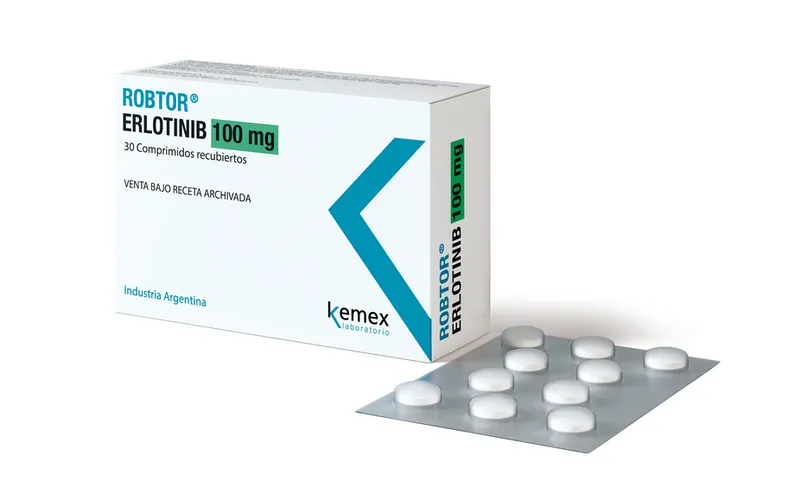Comprehensive Guide to Erlotinib: Uses, Dosage, Side Effects, and More
What is Erlotinib?
Overview of Erlotinib
Generic Name: Erlotinib
Brand Name: Tarceva, generics
Drug Group: EGFR inhibitor (antineoplastic)
Commonly Used For
- Treat non-small cell lung cancer (NSCLC).
- Manage pancreatic cancer.
- Control EGFR-mutated tumors.
Key Characteristics
Form: Oral tablets (25 mg, 100 mg, 150 mg) (detailed in Dosage section).
Mechanism: Inhibits EGFR tyrosine kinase, halting cancer cell proliferation.
Approval: FDA-approved (2004 for Tarceva) and EMA-approved for NSCLC and pancreatic cancer.

Indications and Uses of Erlotinib
Erlotinib is indicated for various cancers, leveraging its targeted inhibition of EGFR signaling:
Non-Small Cell Lung Cancer (NSCLC): Treats locally advanced or metastatic NSCLC with EGFR mutations, improving progression-free survival, per oncology guidelines.
Pancreatic Cancer: Manages advanced pancreatic cancer with gemcitabine, extending survival in metastatic cases, supported by clinical trials.
EGFR-Mutated NSCLC (First-Line): Used as first-line therapy in patients with EGFR exon 19 deletions or L858R mutations, enhancing response rates, per pulmonology protocols.
Head and Neck Cancer: Investigated off-label for recurrent or metastatic head and neck squamous cell carcinoma, improving outcomes, with oncology research.
Colorectal Cancer: Explored off-label for EGFR-expressing metastatic colorectal cancer, stabilizing disease, supported by gastrointestinal oncology studies.
Glioblastoma: Used off-label in recurrent glioblastoma with EGFR amplification, reducing tumor growth, with neurosurgery evidence.
Ovarian Cancer: Investigated off-label for platinum-resistant ovarian cancer, enhancing sensitivity to chemotherapy, per gynecologic oncology data.
Esophageal Cancer: Managed off-label in advanced esophageal cancer with EGFR overexpression, improving local control, with emerging research.
Biliary Tract Cancer: Explored off-label for advanced biliary tract cancer, stabilizing progression, supported by hepatobiliary oncology studies.
Thyroid Cancer: Used off-label in medullary thyroid cancer with EGFR mutations, reducing tumor burden, with endocrinology evidence.
Dosage of Erlotinib
Dosage for Adults
NSCLC:
- 150 mg once daily, on an empty stomach (1 hour before or 2 hours after food).
Pancreatic Cancer:
- 100 mg once daily with gemcitabine, adjusted for tolerability.
EGFR-Mutated NSCLC (First-Line):
- 150 mg once daily, with dose reduction if needed based on side effects.
Dosage for Children
Not recommended for pediatric use due to limited data; off-label use only under pediatric oncologist supervision.
Dosage for Pregnant Women
Pregnancy Category D: Avoid unless benefits outweigh risks (e.g., life-threatening cancer). Consult an obstetrician, with fetal monitoring.
Dosage Adjustments
Renal Impairment: No adjustment needed; monitor in severe cases (CrCl <30 mL/min).
Hepatic Impairment: Mild to moderate (Child-Pugh A or B): Reduce to 100 mg/day; severe (Child-Pugh C): Avoid.
Elderly: Start with 100 mg once daily; increase to 150 mg if tolerated.
Concomitant Medications: Adjust if combined with CYP3A4 inducers/inhibitors (e.g., rifampin, erythromycin), altering levels.
Additional Considerations
- Take this active ingredient on an empty stomach to optimize absorption.
- Avoid smoking, which reduces efficacy.
How to Use Erlotinib
Administration:
- Swallow tablets whole with water, at least 1 hour before or 2 hours after food; avoid grapefruit juice.
- Take at the same time daily for consistency.
Timing: Use once daily, preferably in the morning, as directed.
Monitoring: Watch for rash, diarrhea, or signs of lung issues (e.g., shortness of breath).
Additional Tips:
- Store at 20–25°C (68–77°F), protecting from moisture and light.
- Keep out of reach of children due to toxicity risk.
- Report severe skin peeling, persistent cough, or signs of infection immediately.
Contraindications for Erlotinib
Hypersensitivity: Patients with a known allergy to Erlotinib or EGFR inhibitors.
Severe Hepatic Impairment: Contraindicated in Child-Pugh Class C due to toxicity risk.
Concurrent Use with Strong CYP3A4 Inducers: Avoid with rifampin or similar drugs.
Warnings & Precautions for Erlotinib
General Warnings
Severe Skin Reactions: Risk of rash, bullous lesions, or Stevens-Johnson syndrome; monitor closely.
Interstitial Lung Disease (ILD): Risk of pneumonitis or pulmonary fibrosis; assess respiratory symptoms.
Hepatotoxicity: Risk of liver injury; check liver enzymes regularly.
Gastrointestinal Perforation: Rare risk; discontinue if abdominal pain occurs.
Ocular Disorders: Risk of keratitis or corneal ulceration; monitor eye health.
Additional Warnings
Renal Failure: Risk in dehydrated patients; ensure hydration.
Cardiovascular Events: Rare myocardial infarction; monitor in at-risk patients.
Bleeding Events: Increased risk with anticoagulants; monitor INR.
Hypomagnesemia: Risk with long-term use; supplement if needed.
Hypersensitivity Reactions: Rare anaphylaxis; discontinue if swelling occurs.
Use in Specific Populations
Pregnancy: Category D; avoid unless critical; use contraception.
Breastfeeding: Avoid due to potential toxicity; monitor infant.
Elderly: Higher risk of toxicity; start with lower doses.
Children: Not recommended; off-label use only.
Renal/Hepatic Impairment: Adjust dose; avoid in severe cases.
Additional Precautions
- Inform your doctor about liver disease, smoking status, or medication history before starting this medication.
- Avoid sun exposure due to photosensitivity risk.
Overdose and Management of Erlotinib
Overdose Symptoms
- Diarrhea, rash, or nausea.
- Severe cases: Liver failure, ILD, or gastrointestinal perforation.
- Fatigue, headache, or eye irritation as early signs.
- Seizures with extremely high doses.
Immediate Actions
Contact the Medical Team: Seek immediate medical help.
Supportive Care: Administer IV fluids, monitor vital signs, and treat diarrhea or rash.
Specific Treatment: No antidote; manage symptoms and adjust dose; consider temporary discontinuation.
Monitor: Check liver enzymes, lung function, and kidney parameters for 48–72 hours.
Additional Notes
- Overdose risk is low; store securely.
- Report persistent symptoms (e.g., severe cough, jaundice) promptly.
Side Effects of Erlotinib
Common Side Effects
- Rash (50–70%, managed with moisturizers)
- Diarrhea (40–60%, controlled with loperamide)
- Fatigue (30–50%, decreases with rest)
- Nausea (20–40%, reduced with antiemetics)
- Anorexia (15–30%, improved with nutrition support)
These effects may subside with dose adjustment.
Serious Side Effects
Seek immediate medical attention for:
- Pulmonary: Interstitial lung disease or acute respiratory distress.
- Hepatic: Jaundice, hepatitis, or liver failure.
- Dermatologic: Stevens-Johnson syndrome or toxic epidermal necrolysis.
- Gastrointestinal: Perforation, obstruction, or severe diarrhea.
- Allergic: Rash, angioedema, or anaphylaxis.
Additional Notes
- Regular monitoring for lung function, liver health, and skin condition is advised.
- Report any unusual symptoms (e.g., persistent cough, severe rash) immediately to a healthcare provider.
Drug Interactions with Erlotinib
This active ingredient may interact with:
- CYP3A4 Inhibitors/Inducers: Alters levels (e.g., ketoconazole, rifampin); adjust dose.
- Antacids/H2 Blockers: Reduces absorption; separate dosing by 2 hours.
- Warfarin: Increases bleeding risk; monitor INR.
- Statins: Enhances myopathy risk; use alternatives.
- Anticonvulsants: Alters metabolism (e.g., phenytoin); adjust dose.
Action: Provide your healthcare provider with a complete list of medications.
Patient Education or Lifestyle
Medication Adherence: Take this EGFR inhibitor as prescribed for cancer, following the exact schedule.
Monitoring: Report rash, diarrhea, or shortness of breath immediately.
Lifestyle: Avoid sun exposure; use sunscreen and protective clothing.
Diet: Take on an empty stomach; avoid grapefruit or high-fat meals.
Emergency Awareness: Know signs of lung issues or severe skin reactions; seek care if present.
Follow-Up: Schedule regular check-ups every 1–3 months to monitor liver, lung, and skin health.
Pharmacokinetics of Erlotinib
Absorption: Well-absorbed orally (peak at 4 hours); reduced by food (especially high-fat meals).
Distribution: Volume of distribution ~232 L; 93% protein-bound.
Metabolism: Hepatic via CYP3A4 and CYP1A2 to active metabolites.
Excretion: Primarily fecal (83%) as metabolites; renal (8%); half-life 36 hours.
Half-Life: 36 hours, with steady-state achieved in 7–8 days.
Pharmacodynamics of Erlotinib
This drug exerts its effects by:
Inhibiting EGFR tyrosine kinase, blocking downstream signaling (e.g., MAPK, PI3K/Akt).
Inducing apoptosis in EGFR-overexpressing cancer cells.
Improving survival in NSCLC and pancreatic cancer with EGFR mutations.
Exhibiting dose-dependent risks of rash and gastrointestinal toxicity.
Storage of Erlotinib
- Temperature: Store at 20–25°C (68–77°F); protect from moisture and light.
- Protection: Keep in original container, away from heat sources.
- Safety: Store in a locked container out of reach of children due to toxicity risk.
- Disposal: Dispose of unused tablets per local regulations or consult a pharmacist.
Frequently Asked Questions (FAQs)
Q: What does Erlotinib treat?
A: This medication treats NSCLC and pancreatic cancer.
Q: Can this active ingredient cause rash?
A: Yes, rash is common; use moisturizers.
Q: Is Erlotinib safe for children?
A: No, not recommended; off-label use only.
Q: How is this drug taken?
A: Orally as tablets once daily on an empty stomach, as directed.
Q: How long is Erlotinib treatment?
A: Varies by cancer type, often long-term.
Q: Can I use Erlotinib if pregnant?
A: No, avoid unless critical; consult a doctor.
Regulatory Information
This medication is approved by:
U.S. Food and Drug Administration (FDA): Approved in 2004 (Tarceva) for NSCLC, expanded for pancreatic cancer.
European Medicines Agency (EMA): Approved for NSCLC and pancreatic cancer.
Other Agencies: Approved globally for oncology; consult local guidelines.
References
- U.S. Food and Drug Administration (FDA). (2023). Tarceva (Erlotinib) Prescribing Information.
- Official FDA documentation detailing the drug’s approved uses, dosage, and safety.
- European Medicines Agency (EMA). (2023). Erlotinib Summary of Product Characteristics.
- EMA’s comprehensive information on the medication’s indications and precautions in Europe.
- National Institutes of Health (NIH). (2023). Erlotinib: MedlinePlus Drug Information.
- NIH resource providing detailed information on the drug’s uses, side effects, and precautions.
- World Health Organization (WHO). (2023). WHO Model List of Essential Medicines: Erlotinib.
- WHO’s consideration of Erlotinib for cancer therapy.
- Journal of Clinical Oncology. (2022). Erlotinib in NSCLC with EGFR Mutations.
- Peer-reviewed article on Erlotinib efficacy (note: access may require a subscription).
